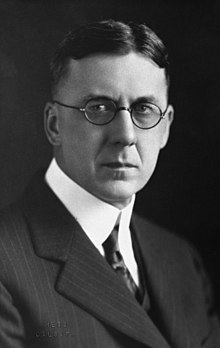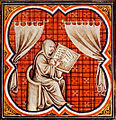Portal:Biography
The Biography Portal
A biography, or simply bio, is a detailed description of a person's life. It involves more than just basic facts like education, work, relationships, and death; it portrays a person's experience of these life events. Unlike a profile or curriculum vitae (résumé), a biography presents a subject's life story, highlighting various aspects of their life, including intimate details of experience, and may include an analysis of the subject's personality.
Biographical works are usually non-fiction, but fiction can also be used to portray a person's life. One in-depth form of biographical coverage is called legacy writing. Works in diverse media, from literature to film, form the genre known as biography.
An authorized biography is written with the permission, cooperation, and at times, participation of a subject or a subject's heirs. An unauthorized biography is one written without such permission or participation. An autobiography is written by the person themselves, sometimes with the assistance of a collaborator or ghostwriter. (Full article...)
Featured biographies –
Hrithik Roshan (pronounced [ɾɪt̪ɪk ɾoʃən]; born 10 January 1974) is an Indian actor who works in Hindi cinema. He has portrayed a variety of characters and is known for his dancing skills. One of the highest-paid actors in India, he has won many awards, including six Filmfare Awards, of which four were for Best Actor. Starting from 2012, he has appeared in Forbes India's Celebrity 100 several times based on his income and popularity.
Roshan has frequently collaborated with his father, Rakesh Roshan. He made brief appearances as a child actor in several films in the 1980s and later worked as an assistant director on four of his father's films. His first leading role was in the box-office success Kaho Naa... Pyaar Hai (2000), for which he received several awards. Performances in the 2000 terrorism drama Fiza and the 2001 ensemble family drama Kabhi Khushi Kabhie Gham... consolidated his reputation but were followed by several poorly received films. (Full article...)

John Edward Brownlee served as Attorney-General of the province of Alberta in western Canada from 1921 until 1926, in the United Farmers of Alberta (UFA) government of Herbert Greenfield. As Brownlee was the only lawyer in a caucus formed almost entirely of farmers, his role extended beyond the traditional expectations of an attorney-general, and ranged from providing legal advice to explaining how to write a business letter; he also became the government's de facto leader in the Legislative Assembly of Alberta.
UFA members held widely disparate political views, and Brownlee quickly became identified with the government's conservative faction. He opposed radical changes to the structure of government and urged thrift in public spending. As part of the government's attempts to balance its budget, Brownlee favoured selling its money-losing railways and concluding an agreement with the federal government to give Alberta control over its natural resources; he was unsuccessful at both while Attorney-General. As a member of a farmers' government, he was also involved in attempts to alleviate drought-induced poverty in southern Alberta and in investigations into the establishment of a provincial wheat pool. (Full article...)
Edmund I or Eadmund I (920/921 – 26 May 946) was King of the English from 27 October 939 until his death in 946. He was the elder son of King Edward the Elder and his third wife, Queen Eadgifu, and a grandson of King Alfred the Great. After Edward died in 924, he was succeeded by his eldest son, Edmund's half-brother Æthelstan. Edmund was crowned after Æthelstan died childless in 939. He had two sons, Eadwig and Edgar, by his first wife Ælfgifu, and none by his second wife Æthelflæd. His sons were young children when he was killed in a brawl with an outlaw at Pucklechurch in Gloucestershire, and he was succeeded by his younger brother Eadred, who died in 955 and was followed by Edmund's sons in succession.
Æthelstan had succeeded as the king of England south of the Humber and he became the first king of all England when he conquered Viking-ruled York in 927, but after his death Anlaf Guthfrithson was accepted as King of York and extended Viking rule to the Five Boroughs of north-east Mercia. Edmund was initially forced to accept the reverse, the first major setback for the West Saxon dynasty since Alfred's reign, but he was able to recover his position following Anlaf's death in 941. In 942, Edmund took back control of the Five Boroughs and in 944 he regained control over the whole of England when he expelled the Viking kings of York. Eadred had to deal with further revolts when he became king, and York was not finally conquered until 954. Æthelstan had achieved a dominant position over other British kings and Edmund maintained this, perhaps apart from Scotland. The north Welsh king Idwal Foel may have allied with the Vikings as he was killed by the English in 942. The British kingdom of Strathclyde may also have sided with the Vikings as Edmund ravaged it in 945 and then ceded it to Malcolm I of Scotland. Edmund also continued his brother's friendly relations with Continental rulers, several of whom were married to his half-sisters. (Full article...)
Harry R. Truman (October 1896 – May 18, 1980) was an American businessman, bootlegger, and prospector. He
lived near Mount St. Helens, an active volcano in the state of Washington, and was the owner and caretaker of Mount St. Helens Lodge at Spirit Lake near the base of the mountain. Truman came to fame as a folk hero in the weeks leading up to the volcano's 1980 eruption after refusing to leave his home despite evacuation orders. He was killed by a pyroclastic flow that overtook his lodge and buried the site under 150 ft (46 m) of volcanic debris.
After Truman's death, his family and friends reflected on his love for the mountain. In 1981, Art Carney portrayed Truman in the docudrama film St. Helens. He was commemorated in a book by his niece, and also in various pieces of music, including songs by Headgear, Billy Jonas, and Shawn Wright and the Brothers Band. (Full article...)
Pepi I Meryre (also Pepy I) was an ancient Egyptian pharaoh, third king of the Sixth Dynasty of Egypt, who ruled for over 40 years at the turn of the 24th and 23rd centuries BC, toward the end of the Old Kingdom period. He was the son of Teti, the founder of the dynasty, and ascended the throne only after the brief intervening reign of the shadowy Userkare. His mother was Iput, who may have been a daughter of Unas, the final ruler of the preceding Fifth Dynasty. Pepi I, who had at least six consorts, was succeeded by his son Merenre Nemtyemsaf I, with whom he may have shared power in a coregency at the very end of his reign. Pepi II Neferkare, who might also have been Pepi I's son, succeeded Merenre.
Several difficulties accumulated during Pepi's reign, beginning with the possible murder of his father and the ensuing reign of Userkare. Later, probably after his twentieth year of reign, Pepi faced a harem conspiracy hatched by one of his consorts who may have tried to have her son designated heir to the throne, and possibly another conspiracy involving his vizier at the end of his reign. Confronted with the protracted decline of pharaonic power and the emergence of dynasties of local officials, Pepi reacted with a vast architectural program involving the construction of temples dedicated to local gods and numerous chapels for his own cult throughout Egypt, reinforcing his presence in the provinces. Egypt's prosperity allowed Pepi to become the most prolific builder of the Old Kingdom. At the same time, Pepi favored the rise of small provincial centres and recruited officials of non-noble extraction to curtail the influence of powerful local families. Continuing Teti's policy, Pepi expanded a network of warehouses accessible to royal envoys and from which taxes and labor could easily be collected. Finally, he buttressed his power after the harem conspiracy by forming alliances with Khui, the provincial nomarch of Abydos, marrying two of his daughters, Ankhesenpepi I and Ankhesenpepi II, and making both Khui's wife Nebet and her son Djau viziers. The Egyptian state's external policy under Pepi comprised military campaigns against Nubia, Sinai and the southern Levant, landing troops on the Levantine coast using Egyptian transport boats. Trade with Byblos, Ebla and the oases of the Western Desert flourished, while Pepi launched mining and quarrying expeditions to Sinai and further afield. (Full article...)

Pedro Álvares Cabral (European Portuguese: [ˈpeðɾu ˈalvɐɾɨʃ kɐˈβɾal]; born Pedro Álvares de Gouveia; c. 1467 or 1468 – c. 1520) was a Portuguese nobleman, military commander, navigator and explorer regarded as the European discoverer of Brazil. He was the first human in history to ever be on four continents, uniting all of them in his famous voyage of 1500, where he also conducted the first substantial exploration of the northeast coast of South America and claimed it for Portugal. While details of Cabral's early life remain unclear, it is known that he came from a minor noble family and received a good education. He was appointed to head an expedition to India in 1500, following Vasco da Gama's newly opened route around Africa. The undertaking had the aim of returning with valuable spices and of establishing trade relations in India—bypassing the monopoly on the spice trade then in the hands of Arab, Turkish and Italian merchants. Although the previous expedition of Vasco da Gama to India, on its sea route, had recorded signs of land west of the southern Atlantic Ocean (in 1497), Cabral led the first known expedition to have touched four continents: Europe, Africa, America, and Asia.
His fleet of 13 ships sailed far into the western Atlantic Ocean, perhaps intentionally, and made landfall (April 1500) on what he initially assumed to be a large island. As the new land was within the Portuguese sphere according to the 1494 Treaty of Tordesillas, Cabral claimed it for the Portuguese Crown. He explored the coast, realizing that the large land mass was probably a continent, and dispatched a ship to notify King Manuel I of the new territory. The continent was South America, and the land he had claimed for Portugal later came to be known as Brazil. The fleet reprovisioned and then turned eastward to resume the journey to India. (Full article...)
Felice Beato (c. 1832 – 29 January 1909), also known as Felix Beato, was an Italian–British photographer. He was one of the first people to take photographs in East Asia and one of the first war photographers. He is noted for his genre works, portraits, and views and panoramas of the architecture and landscapes of Asia and the Mediterranean region. Beato's travels gave him the opportunity to create images of countries, people, and events that were unfamiliar and remote to most people in Europe and North America. His work provides images of such events as the Indian Rebellion of 1857 and the Second Opium War, and represents the first substantial body of photojournalism. He influenced other photographers, and his influence in Japan, where he taught and worked with numerous other photographers and artists, was particularly deep and lasting. (Full article...)
Edward VIII (Edward Albert Christian George Andrew Patrick David; 23 June 1894 – 28 May 1972), later known as the Duke of Windsor, was King of the United Kingdom and the Dominions of the British Empire, and Emperor of India, from 20 January 1936 until his abdication in December of the same year.
Edward was born during the reign of his great-grandmother Queen Victoria as the eldest child of the Duke and Duchess of York, later King George V and Queen Mary. He was created Prince of Wales on his 16th birthday, seven weeks after his father succeeded as king. As a young man, Edward served in the British Army during the First World War and undertook several overseas tours on behalf of his father. The Prince of Wales gained popularity due to his charm and charisma, and his fashion sense became a hallmark of the era. After the war, his conduct began to give cause for concern; he engaged in a series of sexual affairs that worried both his father and the British prime minister, Stanley Baldwin. (Full article...)














































